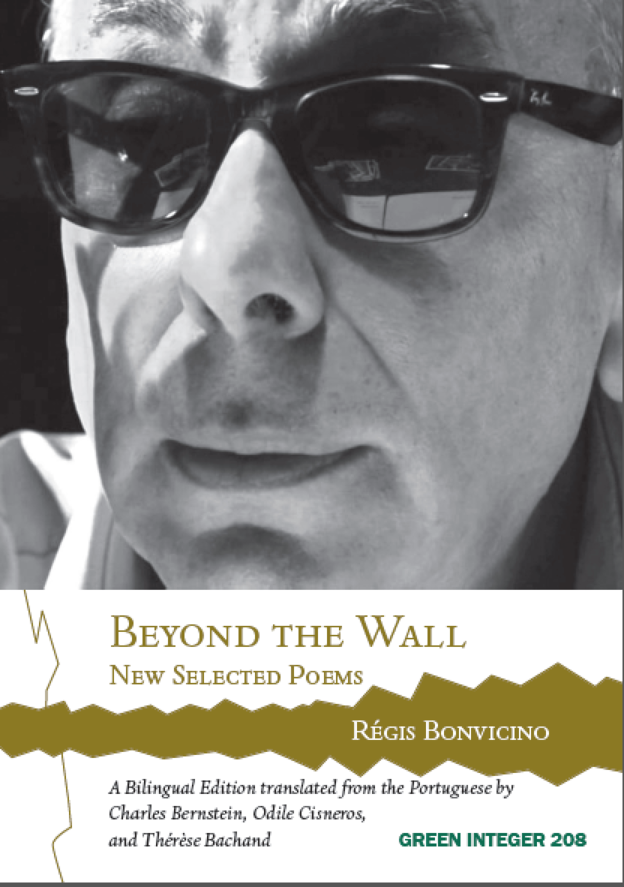
Regis Bonvicino, 'Beyond the Wall: Selected Poems'

Régis Bonvicino is to twenty-first century São Paulo what Charles Baudelaire was to nineteenth-century Paris: the poet as flaneur wandering through the cultural detritus of our time with mordant gaze and dark wit. Bonvicino’s ebullient poems are replete with philosophically searing perceptions and socially conscious lament. Not yet elegy, Bonvicino’s unrelenting acknowledgments center on the parasitic relation between those mangled by society and those doin’ the manglin.’
You can get a hard copy of this new book for $12.95 (or $5 for a PDF) at Green Integer.
Odile Cisneros and Thérèse Bachand and Maria do Carmo Zanini do a fine job adapting the Brazilian poems to the American idiom. I contribute a few translations (and a collaboration). I included two of my translations of Bonvicino in Recalculating. This is one of them, a favorite:
Prose
A poem can’t be sold like music can, can’t be sold like a painting, like a song can, nobody gives a dime, a damn, a poem don’t live beyond its words, its dark and backward suns, can’t be sold like prose can, only as if it were a story or the mocking echo of a poem, can’t be sold like junk can, chunks of mango tree in a garden (or fragments of a garden hose), vats of burnt oil, even like a goldfinch can, singing in a trash dump, the black tongue of the sewers, where algae bloom, can’t be sold like graffiti can, like a photograph or video can, or any arty film, can’t be sold like a print or card can. Me, I’m a lousy trader in worthless things, beset by a plague of words.
Green Integer writes: “Régis Bonvicino’s poems are centered around the dystopia of urban spaces — especially São Paulo where he lives. While his poems include the imagery of nature, they are nevertheless resolutely unromantic, and often brutal in their street-level observations. Friction reigns between the intense lyricism and gritty content, between sound and syntax, between rhyme and intense rhythmic shifts.”
Cassidy Foust reviews the book at LitHub.
••••••• Régis Bonvicino (São Paulo, 1955) is a Brazilian poet, translator, literary critic, and editor. (My photo from 2008.)
Régis Bonvicino (São Paulo, 1955) is a Brazilian poet, translator, literary critic, and editor. (My photo from 2008.)
When he was in his early 20s, Bonvicino published two books, Bicho Papel (1975) and Régis Hotel (1978). His later books include Sósia da Cópia (Max Limonad, 1983), Más Companhias (Olavobrás, 1987), 33 Poemas (Iluminuras, 1990), Outros Poemas (Iluminuras, 1993), Primeiro Tempo (Perspectiva, 1995), Ossos de Borboleta (Editora 34, 1996), Together – um poema, vozes (Ateliê Editorial, 1996), Céu-Eclipse (Editora 34, 1999), Remorso do Cosmos (de ter vindo ao sol) (Ateliê Editorial, 2003), Página Órfã (Martins Fontes, 2007), and Estado Crítico (Editora Hedra, 2013). His collected poems was published in 2010 as Até Agora (Editora Imprensa Oficial, 564 pages).
Translations of his work include Sky-Eclipse: Selected Poems (Los Angeles, Green Integer, 2000) and Blue Tile (Hong Kong, The Chinese University of Press, 2011), translated by Yao Feng. Bonvicino has translated (among others) Argentine poet Oliverio Girondo, French poet Jules Laforgue, and American poets Robert Creeley and Charles Bernstein.
Bonvicino edited one of the main Brazilian poetry anthologies of the last decades, Nothing the Sun Could Not Explain (Los Angeles, Sun & Moon Press, 1997). His collection of 1970s letters with poet Paulo Leminski was published first in 1991, with an introduction by Caetano Veloso. In the 1970s, Bonvicino edited Poesia em Greve, Muda and Qorpo Estranho (with Julio Plaza). In 2001, he founded Sibila, a literary magazine that published eleven print issues. Sibila went digital in 2007.
As a critic, he has written for the newspapers Folha de S. Paulo, O Estado de S. Paulo, and Jornal do Brasil; and in magazines such as Veja and Istoé.
Among the critics who have written about his work are Alcir Pécora, Haroldo de Campos, Boris Schnaiderman, João Adolfo Hansen, Silviano Santiago, Marjorie Perloff, and Julio Castañon Guimarães. About his recent book, Estado crítico, Alcir Pécora has written: “I do not see any other poetry that makes a more implacable criticism of poetry and — at the same time — restates itself as poetry. This happens not because Bonvicino’s books speak of poetry or theorize about the crisis of poetry, but because they tactically move around poetry’s impasses and implant themselves into a ground where their verses occupy the metropolis’s most hostile paths.”
LINKS:
Sibila
Bonvinco and me: “Palin/McCain and the Cult of Irresponsibilty” (2009)
Close Listening conversation with Bonvicino.
“Poetry in a Time of War and Banality” — series in Brazil cocurated by Bonvicino (Lehto, Dragomoschenko, and “traitor to the movement” images (translator/traitor).